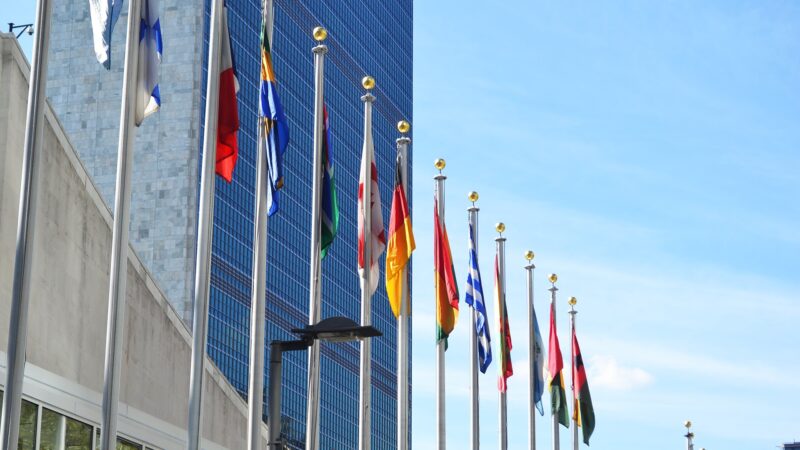
Today, December 10th, we mark Human Rights Day – the anniversary of the adoption of the Universal Declaration of Human Rights (UDHR) by the United Nations in 1948 – a document, like Magna Carta, that has had crucial influence on rights and protections at home and internationally.
Keir Starmer, himself a former human rights lawyer, and the shadow cabinet have made clear that a future Labour foreign and development policy must have human rights at its heart – very much in Labour’s proud tradition of ethical internationalism.
The Labour government led by Clement Attlee played a key part in the agreement of the Universal Declaration. It was the former Labour MP for Warrington, a former general secretary of the GMB and TUC president Charles Dukes who was the British representative during the drafting of the UDHR.
However, British representatives at the time rightly remained frustrated that it had moral but no legal obligation. It was not until 1976, when the International Covenant on Civil and Political Rights (ICCPR) came into force, that legal status was given to most of the UDHR.
Yet today we are faced with a Tory government that seeks to weaken our legal protections and international standing, as highlighted by David Lammy this week, including undermining our commitments to the European Convention on Human Rights and the Human Rights Act. It is a worrying direction of travel that would see the UK move away from the priority put on human rights and democracy of the incoming Biden administration.
For the first time since WW2, we have no judge on the International Court of Justice. We have no representative on the majority of the key human rights treaty bodies to which we are signatories, and only got a seat on the UN Human Rights Council in a non-contested election. So it falls again to Labour to continue to defend human rights at home and abroad, and ensure they have meaningful effect.
The challenge is never greater. Around the world, Covid-19 has changed the lives of millions, impeded or reversed economic growth and taken the lives of hundreds of thousands. And while the pandemic exposed and exploited stark economic and social inequalities, numerous governments have also directly used the crisis as cover to restrict dissent, silence criticism and withdraw protection for the most vulnerable.
In Hong Kong, the Chinese government has aggressively cracked down on opposition and dissenting voices – barring pro-democracy lawmakers from the Legislative Council and sentencing pro-democracy activists lengthy jail terms for their involvement in peaceful protests.
Elsewhere, religious and ethnic minorities have been labelled “super spreaders”. The Egyptian military regime has arrested activists, human rights defenders, lawyers and journalists. Curfews and lockdowns have been brutally enforced in Liberia and Zimbabwe.
Beyond Covid-19, repression and abuse take many forms: police brutality in the United States; the treatment of protesting farmers in India; the fatal massacres at Lekki Toll Gate Plaza and brutal activities of the SARS unit in Nigeria; violent crackdowns on opposition in Tanzania and Uganda; attacks on civilians in Ethiopia and the denial of humanitarian access.
The list goes on. Repressive regimes – from North Korea to Iran, China to Russia – and extremist groups like ISIS and Boko Haram have continued to wage campaigns against fundamental rights and freedoms.
The situation for global women and girls’ rights should shame us all. Even before the pandemic, one in five women experienced domestic violence. Rape and sexual violence continue to be used as a weapon of war in conflicts across the world. Millions of girls are denied the right to education and reproductive health.
In Europe, “LGBT+ free zones” in Poland have tacit support from the government, and LGBT+ people face repression and persecution from Russia to the Gulf.
While the global human rights situation worsens, this government has no strategy – and the silence from the UK in the face of human rights abuses is deafening. While Labour welcomed the long-awaited introduction of Magnitsky sanctions against human rights violators, the regime does not go far enough.
The Chancellor’s decision to abandon our commitment to 0.7% Official Development Assistance spending – and with it the support provided for access to health, education, food and basic dignities across the globe – speaks to a pattern of indifference to upholding rights around the world, including government-backed telecoms companies complicit in the restricting of information relating to human rights abuses against the Rohingya.
In contrast, Labour has been winning victories in parliament to ensure human rights sit at the heart of our future trade deals, listening to workers and trade unionists around the world about the positive impact Britain could be making. As we mark Human Rights Day, it is clear that the challenges could not be greater. That is why we must, as a party and a movement, recommit to those bold principles of 1948. Not just in word, but in deed.




More from LabourList
‘Council Tax shouldn’t punish those who have the least or those we owe the most’
Two-thirds of Labour members say government has made too many policy U-turns, poll reveals
‘Two states, one future: five steps on the path to peace for Israelis and Palestinians’